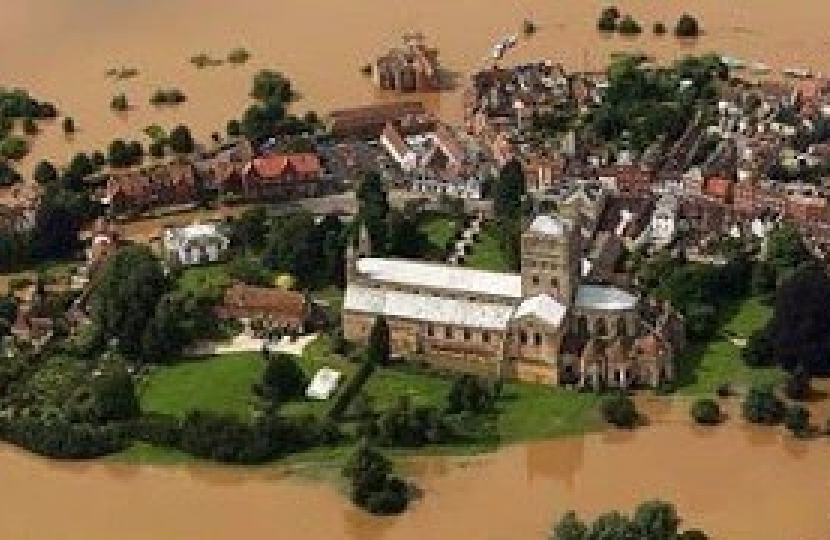
Ten years ago to this day, twelve hours of intense rainfall in Gloucester and nearby followed the wettest June and July since records began. This caused what The Citizen has rightly called “the worst natural disaster in the county’s living memory.” It’s worth recapping what happened, what has happened since and the wider lessons, still relevant today.
What happened that day is very clear in my memory, as it will be for us all. By the evening it was chaos. Cars under the railway bridges completely under water: and virtually all roads impassable. In big picture terms 10,000 motorists were stuck between junctions 10 and 12 of the M5 and 500 people stranded at Gloucester Railway Station. When the Mythe water treatment centre lost power 350,000 people were without running water for 18 days. The Castlemead electricity substation was overwhelmed, cutting power to almost 50,000 of my constituents. Some 4,000 houses, 500 businesses and 20 schools were flooded, and three people died. I’ll never forget the mess left by the water at homes in Manor Road, Elmbridge.
There was a precedent. In 1607, a great flood swept up the Bristol Channel ‘with huge and mighty hills of water’ some 25-feet high. It spread over 200 square miles of land and killed 2,000 people. The great Gloucestershire flood 400 years later was different and resulted in much less loss of life, but its impact was huge, and almost led to a national crisis.
I’ve written for The Citizen about the water volunteers that I organised once water was cut off in the city, and that we weren’t allowed to deliver water to those too ill or old to move – because not all the volunteers had CRBs. I asked at what point in critical civil disaster situations organisations have to cut corners and accept risk in order to save lives. Leadership at all levels in natural or other disasters is critical, as we have been reminded since the dreadful inferno at Grenfell Tower.
Meanwhile, down at the Tri-Service Centre at Waterwells, then Chief Constable Tim Brain, as Gold Commander, had powers to co-ordinate national and local bodies, Armed Forces and charities. These Gold Command structures are crucial, and work well if residents trust the lead individual and organisation. As we now know, if the trust is not there, for whatever reason, then the Government has to step in and bring in other individuals and organisations.
Afterwards the Pitt Review made recommendations on how to mitigate future flood risks. Much progress has since been implemented – brooks and streams cleared: willows cut back and responsibilities better known: Flood Re established to handle insurance issues; and Victorian sewers and drains replaced, notably in Westgate and Kingsholm, at a cost of £13 million by Severn Trent. Those are huge improvements and there has been no flooding in Worcester Street or Kingsholm Road since, despite lesser floods on two occasions since in Gloucester.
The major Government and county council-financed bit of infrastructure is the new diversion lake close to Elmbridge Court, to which surplus water from the Horsbere brook is automatically transferred. That’s already successfully prevented flooding in Longlevens and Elmbridge twice since 2007. And lastly, the Environment Agency has greatly improved its mapping, modelling and communications, thanks to better technology. Anyone living near the Severn can now get regular email and text ‘flood alerts’, and I encourage all my constituents to sign up here.
There are things still to be resolved, such as the height of the wall protecting homes by the river at Pool Meadow. We must ensure that watercourses are kept clear, man-made defences maintained, crisis planning kept up to date, structures reviewed, substations protected and contingency plans in place. We also need to be cautious about planning permission for homes on floodplains as we may not have to wait 400 years for the next natural disaster.
There are many organisations to thank for their response that day, including the Fire & Rescue Service demonstrating the vital rescue part of their role: and local media for brilliant information updates. Today’s commemorative articles will rightly highlight the value of resilience, the power of communities and the importance of pulling together in a crisis.
That is relevant to every challenge in life. The Brexit negotiations are very different from the Gloucestershire floods or the Grenfell Tower inferno, but for all of them we need resilience, leadership and a shared purpose, to get through the crisis. The word “crisis” translates as “danger opportunity” in Chinese. We have to deal with the danger and realise the opportunity – which is to be better prepared for the next challenge life throws our way.
Today, across our city and county, my sense is that we’ll remember what happened, reflect on the lessons and pray that other communities pull through with hard work, luck and good spirit – as we did ten years ago.
Do let me know what other lessons you felt came of the Gloucestershire floods of 2007 on [email protected].